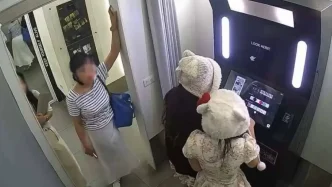At the Bertam Putra Ramadan bazaar in Kuala Lumpur, the vibrant hum of community spirit is as palpable as the aroma of fried noodles and local kuih. As the holy month of Ramadan unfolds, vendors here are not only serving up traditional delicacies but also embodying the Islamic principle of sedekah (almsgiving) by ensuring that no food goes to waste. Leftovers are shared among traders, donated to customers, or taken home to neighbours, reflecting a collective commitment to generosity and sustainability during this sacred time.
The Ramadan bazaar, a seasonal market that springs up across Malaysia during the fasting month, is a cultural cornerstone where Muslims gather to purchase food for buka puasa, the breaking of the fast at sunset. At Bertam Putra, located in the bustling capital, vendors are taking extra steps to manage their stock carefully, ensuring surplus food finds a purpose beyond the stall.
Mohd Firdaus Idris, a 32-year-old food operator who has been a fixture at the bazaar for six years, prepares a tempting array of fried dishes including noodles, bee hoon, and rice. Selling between 100 and 150 packets daily at RM4 each, he acknowledges that leftovers are inevitable on some days despite his best efforts to gauge demand. “When maghrib approaches, signalling the time for buka puasa, I give away my food to other vendors and customers for free—usually around 20 to 30 packets,” he explains. On other occasions, he brings the extras home to share with his neighbours. With the crowd expected to swell in the coming weeks of Ramadan, Mohd Firdaus remains optimistic that his portions will meet the growing demand.
Similarly, Siti Munirah Rahmat, a 38-year-old trader selling a variety of local kuih—traditional Malaysian sweets and snacks—echoes this ethos of giving. “Rather than throwing them away, we give the food to others,” she says. For Siti Munirah, donating leftovers is not just practical but deeply meaningful. “Giving out food during Ramadan is a form of sedekah and is encouraged in Islam,” she adds, highlighting the spiritual significance of her actions.
Beverage trader Najihah Sezali, at just 20 years old, takes a different approach to managing surplus stock. Selling around 1,000 packets of drinks daily at RM3 each, she slashes prices towards the end of the day to clear her inventory. “If there are extras, we sell them for RM1, or six packets for RM5,” she explains. This strategy not only minimises waste but also ensures that more people can afford to enjoy her offerings as they break their fast.
This culture of sharing and resourcefulness is supported by local authorities, though formal initiatives appear limited. Zainuddin Mohamed, a councillor from Seberang Perai City, urges traders to plan their food preparation carefully to avoid excess. “Traders can also share the surplus food, in line with the spirit of Ramadan,” he notes, emphasising the importance of maintaining hygiene and safety in food handling. However, he clarifies that the council currently has no specific programme dedicated to managing food waste at the bazaar, leaving the onus on individual vendors to uphold these values.
The efforts at Bertam Putra reflect a broader cultural emphasis on community and charity during Ramadan, a month of fasting, prayer, and reflection for Muslims worldwide. In Malaysia, where Islam is the predominant religion, the concept of sedekah extends beyond monetary donations to include acts of kindness such as sharing food. This practice not only addresses practical concerns like food waste but also strengthens communal bonds, as vendors and customers alike participate in a cycle of giving and receiving.
While the story at Bertam Putra is one of small-scale, grassroots initiative, it also raises questions about the potential for larger, coordinated efforts to tackle food waste during Ramadan bazaars nationwide. With hundreds of such markets operating across Malaysia each year, the cumulative impact of surplus food could be significant if harnessed effectively. For now, the vendors of Bertam Putra are leading by example, demonstrating that even in the absence of formal policies, individual actions can make a meaningful difference.
As the sun sets over Kuala Lumpur and the call to prayer signals the end of the day’s fast, the Bertam Putra Ramadan bazaar stands as a testament to the power of community spirit. Here, every packet of food, whether sold or shared, carries with it a message of generosity—a reminder of the deeper values that define this holy month.














